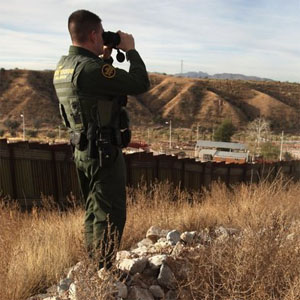I spent the five happiest years of my life in a morgue. As a forensic scientist in the Cleveland coroner’s office I analyzed gunshot residue on hands and clothing, hairs, fibers, paint, glass, DNA, blood and many other forms of trace evidence, as well as crime scenes. Now I'm a certified latent print examiner and CSI for a police department in Florida. I also write a series of forensic suspense novels, turning the day job into fiction. My books have been translated into six languages.
You would need another forensic pathologist to review the work of the first forensic pathologist.
Best of luck.
Bodies begin to deteriorate immediately, but the process might progress more slowly or less slowly depending on temperature, humidity, exposure or any medical conditions of the victim.
No.
Where ever it’s convenient, I suppose.
Border Patrol Agent
 Do you ever feel sorry for the illegals you catch trying to cross the border?
Do you ever feel sorry for the illegals you catch trying to cross the border?
Inner City English Teacher
 Are you pressured by administrators to pass kids that aren't ready yet?
Are you pressured by administrators to pass kids that aren't ready yet?
Fashion Model
 How prevalent are eating disorders in modeling?
How prevalent are eating disorders in modeling?
I’m not a pathologist but I think it’s possible even if not likely. Bodies start to stiffen in 1-2 hours but rigor reaches its peak somewhere around 12 hours. It can depend a great deal on temperature, body type and medical conditions.
Sorry, but I’m not trained in digital forensics. I have absolutely no idea.
I see, but I still couldn't say. It depends entirely upon the hiring agency and what kind of pool of applicants they typically have--basically, who they have to choose from. There will be a basic set of requirements but after that, advanced degrees are better than high school diplomas, degrees from accredited schools better than non-accredited, internships at forensic agencies very helpful, etc. The best way to know is to call the places you would like to work at and ask them. If you can get a tour of their facility, even better, then you can gently ask the people who work there where they went to school and so on. Shorter answer: It won't automatically get you in or automatically keep you from getting in. Of course it certainly couldn't hurt. Best of luck!
-OR-
 Login with Facebook
Login with Facebook (max 20 characters - letters, numbers, and underscores only. Note that your username is private, and you have the option to choose an alias when asking questions or hosting a Q&A.)
(A valid e-mail address is required. Your e-mail will not be shared with anyone.)
(min 5 characters)
By checking this box, you acknowledge that you have read and agree to Jobstr.com’s Terms and Privacy Policy.
-OR-
 Register with Facebook
Register with Facebook(Don't worry: you'll be able to choose an alias when asking questions or hosting a Q&A.)